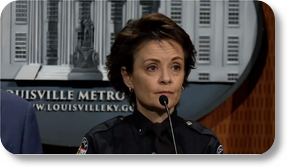
Louisville Metro Police have a new online dashboard that will allow the public to track progress on police reform, after a top to bottom review of the department.
In a news conference on Wednesday, Mayor Greg Fischer said the dashboard is in response to dozens of recommendations made in the Hillard Heintze independent review of LMPD policy and procedures.
The 150-page report was made public in January as "an unflinching look at what was working - and what was not. It clearly outlined the pain in our community as a whole, and within LMPD," said Fischer. There are more than 100 recommendations for the department.
LMPD Chief Erika Shields says she has doubled down on making those changes, since the report was released, but she says it's important to include citizens so they can see the changes as they happen.
The dashboard lists the 12 key domain subject areas and tracks progress on recommendations through four types of status: Completed, In Process, Planning & Development, and Under Review. Dashboard users can also click on each of the subject areas to find the specific recommendations from the report. The results will be updated quarterly. To see the new dashboard, click here.
Shields wants to go a step further with the dashboard, "I'm looking to check completed because listen, if we're really making change, that's not going to be the judge of it. The judge of it will be a prolonged period of time where we can show we're doing things differently."
Chief Shields says some of the "completed" items on the dashboard now only required minor changes like wording in policies.
She says most of the recommendations will not be completed quickly.
Fischer requested the top-to-bottom evaluation last summer after he fired former LMPD Chief Steve Conrad, saying the work would include community input and result in recommended actions.
Hillard Heintze was tasked with a review that included looking at motor vehicle stops; de-escalation tactics; executing warrants; policies that might contribute to possible racial profiling and bias; training policies; and community engagement.
Findings include that community trust is a major issue in Louisville. In addition, the report described police morale as low; 75 percent of officers who responded to the survey said they would leave the department and go to another agency if they could.
Also, according to the report, there is a "racial disproportionality" in police actions such as traffic stops and arrests. It found that Black people are pulled over and arrested unevenly based on population size.
And the department needs more diversity, as the Black community is underrepresented in both the rank-and-file and upper ranks.
Grassroots calls for changes to LMPD grew last year after the fatal police shooting of Breonna Taylor and the death of David McAtee, who was shot and killed by the Kentucky National Guard during a joint operation with LMPD during racial justice protests.
Hillard Heintze conducted anonymous online and telephone surveys last fall, with 7,805 people and 508 LMPD officers responding, according to city officials. Among LMPD, 78 percent of sworn officers participated.
In April, Attorney General Merrick Garland announced that the Department of Justice would launch a sweeping federal investigation of LMPD's policing and practices. The "pattern or practice" review will target officers' use of force, including against people participating in First Amendment-protected activities.
It also aims to determine if the department engages in discriminatory policing or if it makes unconstitutional stops, searches and seizures on patrols and when executing search warrants at private homes.
DOJ investigators explained they'll look at incidents from the past few years, and consider some historical context, in the probe that could last a year or more.
If the investigation identifies specific violations, it will then work with Louisville leaders to develop an enforceable action plan to fix them. The Department of Justice has a history of doing so in other cities like Baltimore, Maryland; Newark, New Jersey; and Ferguson, Missouri.
The Justice department attorneys said they wish to hear from anyone with information that could assist the investigation: community members, protesters, police officers, disabled people, homeless advocates and others.






